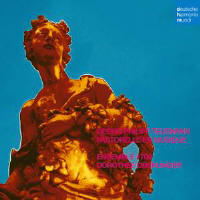Texte paru dans: / Appeared in: |
|
|
Outil de traduction |
|
|
Nearly two decades since the premiere recording conducted by Kirill Karabits, this staged production at the historic Schlosstheater in Potsdam’s Neues Palais was recorded live in June 2021. Ensemble 1700’s playing in the introductory concerto-suite has splendid theatricality, their trumpets doubled by horns an octave below, and conductor Dorothee Oberlinger giving rein to ad libitum timpani. The opening chorus grounded on rustic bass drones is a musette performed heartily by the entire collective. After Damon’s petite air de cour ‘Vos rigeurs, mon enfant’ (a chaconne sung gracefully by baritone Florian Götz, accompanied only by continuo), the quick-paced musical fun and games switch to Caliste’s feisty response in the trumpet aria ‘Ich scheide von hinnen’, sung brightly by Lydia Teuscher. Instrumental and vocal contributions aptly characterise the stalemate between Amyntas and Iris, who is caught in two minds about whether or not to requite his love; her triple-time ‘Soll ich lieben?’, sung with excellent technique and poise by Marie Lys, insinuates that the lady doth protest too much. Amyntas’s mock-heroic ‘Rufet Triumph’, featuring splendid fanfares for two trumpets reinforced by bellicose kettledrums, is undermined a little by Alois Mühlbacher’s uneven singing, but the countertenor comes across more successfully in the pastoral hornpipe ‘Il n’est point de bergere’ (Oberlinger adds recorders and clattering percussion). Things move instantly from the ridiculous to the sublime with Caliste’s uneasy lament ‘Dir ahnet was’, in which Teuscher has a dialogue with melancholic solo oboe and compassionate continuo; she then falls asleep in a beguiling five-minute sinfonia for quiet four-part strings and solo treble recorder, influenced by the Lullian sommeil and inspiring Telemann to his very best. Damon and the chorus soothe the sleeping Caliste in an almost Vivaldian pastoral arioso and a hushed French chorus. Iris and Amyntas proclaim their contentment in a lively love duet, and the double wedding is readied during an orchestral Intrada with braying horns. The closing chorus mixes bagpipe-like effects of musette sections with horn-festooned refrains. Telemanniacs will find plenty to amuse them – not least DHM’s careless English mistranslation on page 47 of the libretto (Iris referring to her beloved Amyntas as ‘A Mint Arse’).
|
|




